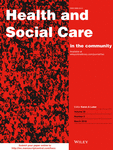Community health workers’ experiences of using video teaching tools during home visits—A pilot study
Abstract
Innovations in health, such as the use of tablet computers, show promise in broadening the scope of work of community health workers (CHWs), and play an important role in keeping CHWs and their clients up to date with advancements in health. While the use of mobile phones and tablets is innovative, the applicability of these technologies in different contexts remains poorly understood. Furthermore, little is known about the acceptability and feasibility of the use of video teaching tools on such devices across diverse contexts. In this study, we aimed to explore the acceptability and feasibility of using tablets with teaching videos (about HIV, alcohol, nutrition and breastfeeding) to support the health promotion efforts of 24 CHWs who work with pregnant mothers and mothers of young children in an urban township in South Africa. Between November 2015 and May 2016, we conducted focus groups and identified four key themes (with several sub-themes) that demonstrated factors related to the acceptability and feasibility of these devices and their content. Focus group transcripts were analysed thematically using qualitative data analysis software. The findings indicated that while the devices contained several supportive features (such as lightening the workload, and stimulating interest in their work), they also contained several restrictive features (safety and confidentiality). CHWs considered the video content an important tool to engage not only their clients but also family members and the community at large. Issues surrounding safety, privacy and confidentiality of using these devices require careful consideration prior to implementation in large-scale studies. Furthermore, stigma associated with household visits by CHWs and the nature of their work also need to be addressed by researchers and programme implementers. Overall, CHWs deemed the devices and the video content an acceptable and feasible means with which to provide health promotion and education among their clients.




